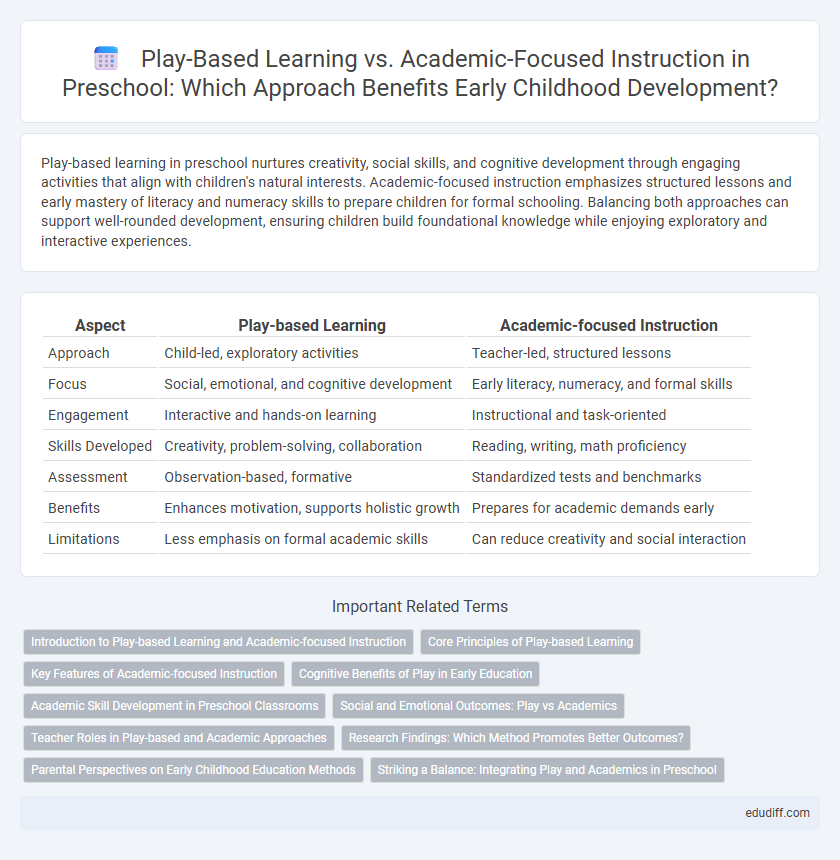Play-based learning in preschool nurtures creativity, social skills, and cognitive development through engaging activities that align with children's natural interests. Academic-focused instruction emphasizes structured lessons and early mastery of literacy and numeracy skills to prepare children for formal schooling. Balancing both approaches can support well-rounded development, ensuring children build foundational knowledge while enjoying exploratory and interactive experiences.
Table of Comparison
| Aspect | Play-based Learning | Academic-focused Instruction |
|---|---|---|
| Approach | Child-led, exploratory activities | Teacher-led, structured lessons |
| Focus | Social, emotional, and cognitive development | Early literacy, numeracy, and formal skills |
| Engagement | Interactive and hands-on learning | Instructional and task-oriented |
| Skills Developed | Creativity, problem-solving, collaboration | Reading, writing, math proficiency |
| Assessment | Observation-based, formative | Standardized tests and benchmarks |
| Benefits | Enhances motivation, supports holistic growth | Prepares for academic demands early |
| Limitations | Less emphasis on formal academic skills | Can reduce creativity and social interaction |
Introduction to Play-based Learning and Academic-focused Instruction
Play-based learning in preschool emphasizes exploration, creativity, and social interaction, fostering cognitive and emotional development through hands-on activities. Academic-focused instruction centers on structured lessons that target early literacy and numeracy skills to prepare children for formal education settings. Integrating these approaches balances developmental readiness with foundational academic competencies for holistic early childhood education.
Core Principles of Play-based Learning
Play-based learning emphasizes child-centered exploration, creativity, and social interaction as foundational principles, fostering cognitive, emotional, and physical development through hands-on activities. Unlike academic-focused instruction, it prioritizes intrinsic motivation and experiential discovery over rigid curricula and standardized assessments. This approach supports holistic growth by integrating play with problem-solving, language acquisition, and collaboration skills critical for early childhood development.
Key Features of Academic-focused Instruction
Academic-focused instruction in preschools emphasizes structured learning objectives, direct teaching methods, and early literacy and numeracy skills development. This approach prioritizes measurable outcomes, teacher-led activities, and standardized assessments to monitor progress. Key features include a curriculum aligned with academic standards, explicit skill-building exercises, and a focus on cognitive development milestones.
Cognitive Benefits of Play in Early Education
Play-based learning in preschool fosters critical cognitive development by encouraging problem-solving, creativity, and social interaction, which enhance neural connections and executive functioning. Academic-focused instruction often emphasizes rote memorization and structured tasks, potentially limiting opportunities for imaginative exploration and active learning. Research indicates that play-based approaches lead to improved language acquisition, memory retention, and flexible thinking, essential skills for long-term academic success.
Academic Skill Development in Preschool Classrooms
Academic skill development in preschool classrooms emphasizes foundational literacy, numeracy, and cognitive abilities essential for kindergarten readiness. Targeted instruction in letter recognition, counting, and problem-solving enhances early academic achievement and supports long-term educational success. Structured activities that integrate academic concepts with age-appropriate engagement foster skill acquisition and build a strong educational foundation.
Social and Emotional Outcomes: Play vs Academics
Play-based learning in preschool fosters critical social and emotional development by encouraging cooperation, empathy, and self-regulation through interactive activities. Academic-focused instruction tends to prioritize cognitive skills, often limiting opportunities for children to develop emotional resilience and peer relationships. Research shows children engaged in play-based environments exhibit stronger social competence and emotional well-being compared to those in primarily academics-driven settings.
Teacher Roles in Play-based and Academic Approaches
Teachers in play-based learning environments act as facilitators who guide exploration, encourage creativity, and support social development through interactive play. In academic-focused instruction, teachers primarily deliver structured lessons, assess knowledge acquisition, and maintain classroom discipline to meet curriculum standards. Effective preschool education balances both approaches by adapting teacher roles to foster cognitive skills while nurturing emotional and social growth.
Research Findings: Which Method Promotes Better Outcomes?
Research findings indicate that play-based learning in preschool fosters superior cognitive, social, and emotional development compared to academic-focused instruction, promoting creativity and problem-solving skills. Studies reveal that children engaged in play-based environments demonstrate higher language acquisition, improved executive function, and greater long-term academic success. Conversely, academic-focused instruction often leads to early stress and reduced motivation, highlighting the effectiveness of play-based approaches in early childhood education.
Parental Perspectives on Early Childhood Education Methods
Parents often view play-based learning as essential for fostering creativity, social skills, and emotional development in preschoolers. In contrast, some families prioritize academic-focused instruction, believing early mastery of literacy and numeracy provides a foundation for future success. Surveys indicate a growing preference for balanced approaches that integrate structured academics with ample opportunities for imaginative play.
Striking a Balance: Integrating Play and Academics in Preschool
Striking a balance between play-based learning and academic-focused instruction in preschool fosters holistic child development by blending creativity with foundational skills like literacy and numeracy. Integrating structured activities alongside free play enhances cognitive, social, and emotional growth, preparing children for future academic success. Research shows that a balanced approach improves engagement and retention, making learning both effective and enjoyable.
Play-based Learning vs Academic-focused Instruction Infographic

 edudiff.com
edudiff.com